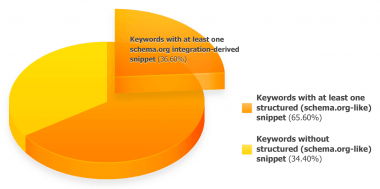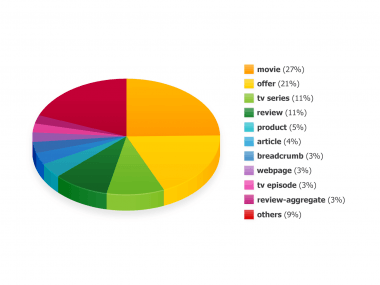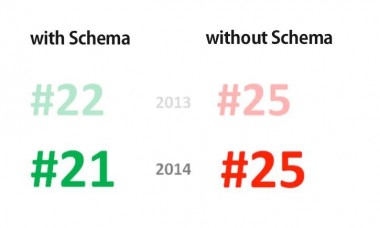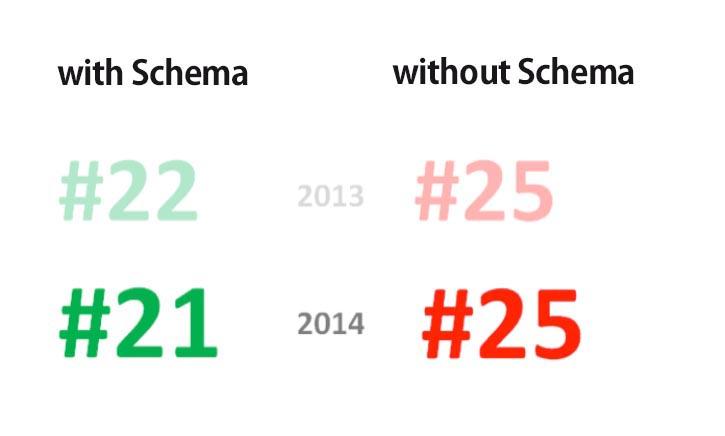Launched by Google, Microsoft, Yahoo! and recently adopted by Yandex, Schema.org is an initiative to standardize a set of tools to help webmasters incorporate structured data within their sites.
Structured data is a way of formatting online information using a specific language or markup placed within the source code of web pages so search engines can easily understand it. It’s used by the leading search engines to identify and understand web content, so they can enhance the results displayed for specific search queries, for example by integrating additional text, images or links known as rich snippets.
The rich snippets can include information such as reviews and product ratings or pricing information. When this additional information shows up in search results, it can potentially drive extra clicks, traffic and conversions.
We studied tens of thousands keyword results and half a million domains to analyze how often domains or URLs using markup schema are displayed in Google’s US search results. We looked at whether a schema integration may have a positive effect on a domain’s rankings. Despite the potential marketing boost, our new research at Searchmetrics shows that few sites are actually making use of schema markup.
Nearly 40% of Keywords on Google Include Schema Snippets
Of the Google search results for tens of thousands of keywords we studied, 36.6% included at least one snippet with information derived from Schema.org (see chart below).
 Nearly 40% of Keywords on Google Include Schema Snippets
Nearly 40% of Keywords on Google Include Schema SnippetsOf course, some sites use other tools to markup structured data. Large sites such as Amazon.com and Wikipedia.org seem to have agreed their own methods with Google in this area. So, if you include results which incorporate at least one integration which is Schema.org-‘like’, then the number goes up to 65.6%. This shows the potential power of using structured data and Schema.org.
Find more information about the various types of snippets and integrations that can be supported by Schema.org.
If you had to guess which Schema.org integrations are shown most frequently on Google, you’d probably say something like “Reviews” because they are applicable to such a wide variety of domains – for example, anyone that offers products or services.
 The most common Schema.org integrations are “Movies” and “Offers”
The most common Schema.org integrations are “Movies” and “Offers”But as you can see from the chart , “movie” integrations came out on top (27%). This included integrations from popular movie sites such as IMDb, for example.
The second most frequent integration at 21% was “offers” which is commonly used when online retail and eCommerce sites appear in search results – a very important integration to drive traffic and conversions for transactional searches.
Pages Using Schema.org Markups Rank Higher in Google?
We wanted to test the hypothesis that the integration of schema.org data in Google might be rewarded with a better ranking. So we analyzed the top 50 search results for our keyword set, taking into account sites both with and without schema integrations.
 Pages using Schema.org markups have higher Google rankings
Pages using Schema.org markups have higher Google rankingsWe found the average ranking of domains without schema integrations (99.7%) is 25.
Sites with schema integrations in 2014 ranked on average four positions better than those without.
It must be noted that this is not necessarily a causal relationship. It may not be the case that pages are actually preferred by Google just because they provide schema integrations. An alternative explanation for the higher rankings could be that webmasters who use schema.org integrations are one step ahead of the competition due to other factors that affect their rankings in a positive way.
Very Few Domains Integrate Schema
Despite the potential benefits, currently only a small fraction of domains use the integration of schema.org markups. In fact, based on our keyword sets, the percentage was only 0.3%. In general, we found that larger sites are more likely to use schema markup.
Takeaway
So, while Schema offers online marketers the potential to increase traffic to their sites by helping them providing useful information to search engines which could result in enhanced search listings, few sites are making use of it. This could be due to a gap in technical knowledge or just a time lag.
About Our Study:
- In search results for tens of thousands of keywords we analyzed each of the first 50 search results looking for integrations that result from using schema.org and/or other structured data.
- We analyzed over half a million domains to determine whether schema.org data can be found.
- The survey was conducted in March 2014 for Google USA.





